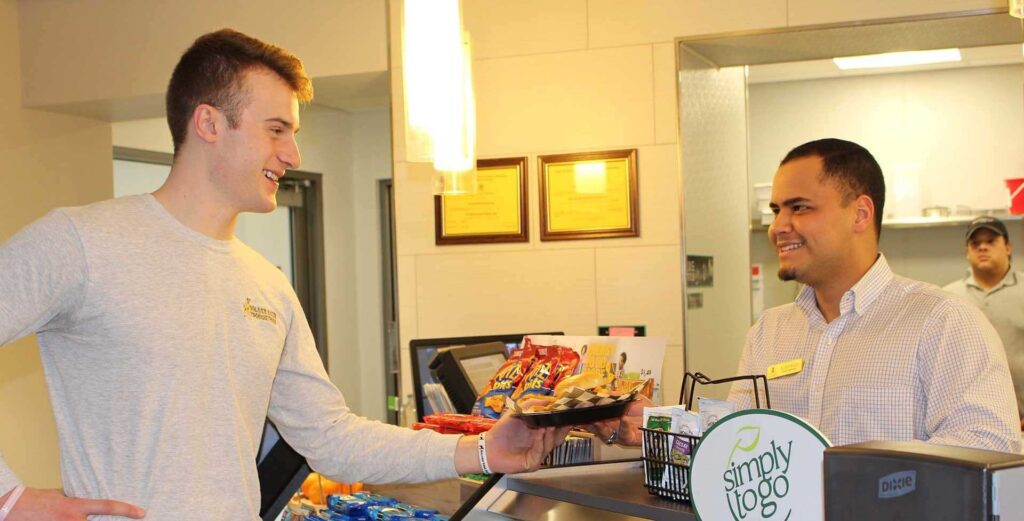Tag: Alyssa Cohen ’21
Save Three Lives: Take Part in Campus Blood Drives
by The Cowl Editor on September 22, 2019
Opinion

by Alyssa Cohen ’21
Opinion Staff
The act of donating blood is a small way to pay it forward that can make a tremendous impact on humanity. The entire blood donation process typically takes about one to two hours—and for each successful donation of one pint of blood, the donor could save up to three lives.
According to the Red Cross, blood transfusions are the most common procedure performed in hospitals, as they are used to treat patients with a variety of health problems, from people with severe anemia, to cancer patients and those with rare blood disorders, to trauma victims. In fact, one out of every seven people who are admitted to a hospital will receive a blood transfusion—32,000 pints of blood are transfused nationwide on a daily basis.
In turn, aside from the incentive of potentially saving three human lives and providing units to replenish blood bank shortages, donating blood also boasts personal health benefits.
Donating blood can reduce an individual’s risk for hemochromatosis, or excess absorption of iron by the body, which can concurrently reduce an individual’s risk for cancer, as well as heart and liver disease. Also, according to the Red Cross, blood donation stimulates red blood cell production, which can improve energy and expedite weight loss.
Additionally, there is a national deficit of units in blood banks. This poses a threat to the health of those reliant upon transfusions. This supply deficit at blood banks only increases the necessity of donor participation in nearby drives.
Our local community in particular is in need of donors, as the Rhode Island Blood Center is presently experiencing a shortage in donations.
Kara LeBlanc, a manager at the RIBC, reported to Turnto10 news over the summer, “Our donor base is dwindling, we certainly need new donors.”
If you are interested in donating blood in the near future, you can participate in the frequent drives held right on the PC campus by the Rhode Island Blood Center in ‘64 Hall. Free pizza and snacks are typically provided for donors and sometimes participants may be entered into drawings for prizes such as Patriots tickets.
If for any reason you may be disqualified from donating, there are other roles you can fulfill at community drives. Blood drive coordinators and volunteers are equally as critical as donors in the effectiveness of organizations such as the Rhode Island Blood Center or American Red Cross.
Given the commonality of transfusion procedures, you never know when you or someone you care about may require a unit of blood, so pay it forward, help save three lives, and donate blood at the next opportunity that presents itself.
Moving towards a More Standarized, Diverse DWC Program
by The Cowl Editor on September 13, 2019
Opinion

by Alyssa Cohen ’21
Opinion Staff
The controversy over the definition of “Western Civilization” and the need to broaden the scope of the DWC curriculum has been a hotly contested topic on campus over the past several years.
Last semester Providence College held a forum to discuss the meaning of Western Civilization and how its definition correlates with the curriculum of DWC. The workshop, entitled “The Misuses of Western Civilization,” was comprised of a panel of DWC professors led by Dr. Alexander Moffett, director of the DWC program. The panel discussed the impact of white supremacy upon present culture and its potential anti-Islamic implications in the DWC classroom in light of the recent Christchurch shooting in New Zealand. This discussion amongst professors and students particularly illuminated the need for a more standardized, diversified DWC curriculum.
The majority of professors on the panel emphasized the importance of acknowledging the racial implications of the DWC texts and reading from numerous perspectives, such as female perspectives, as frequently as possible. They also underscored the value of each DWC seminar engaging in conversations about race and gender, in order to abolish the “us versus them” attitude and acknowledge the existence of white privilege as well as its impact on the development of Western civilization and our present society and culture.
Many professors on the panel emphasized how incorporating a multitude of perspectives in the program would provide students with a more honest, panoramic, and ethical view of the development of Western civilization.
Such professors also highlighted how the expansion of the program’s scope of study could strive to combat the fear, stereotyping, and ostracization of “the other” present in the Providence College community and in American culture at large.
Essentially, this dialogue illuminated a discord within the DWC program—depending upon a student’s professors, some sections of DWC read a diversity of narratives and examine the texts through different gender, cultural, and racial lenses while other sections maintain the teaching of a narrow, white, male-centric perspective.
Anna Lane ’21, A DWC student in the Honors Program, described her sections of DWC as being taught through a more culturally “panoramic” lens.
“We read works last year like Incidents in the Life of a Slave Girl by Harriet Jacobs to analyze a genuine firsthand account of the experiences of a female African American Slave and critiqued the white supremacy embedded in texts like Oroonoko by Aphra Behn in our seminar discussions,” said Lane.
Conversely, Vasco Medeiros ’21, recounted a different experience with the DWC program, as he explained how his DWC 102 team taught through a scope he dubbed “microscopic.”
“Nearly every text we read was written from a white, male, and in the majority of cases, Catholic perspective. In fact, I think Shakespeare’s The Tempest may have been the only non-religious work we read all semester,” said Medeiros.
Clearly, Lane’s experience with DWC, through studying a diversity of cultural and gender perspectives helped her achieve a more complete and accurate view of the establishment of the Western world from that which the program provided to Medeiros. As underscored by the stark contrasts between Lane and Medeiros’ educational experiences with the College’s DWC program, the need for a more standardized, diversified curriculum across all DWC teams proves essential in providing each of the College’s students with the intricate humanities background the program boasts.
According to PC’s website, DWC is promoted as a program in which a student will “explore human history through many perspectives—from literature to philosophy to theology to art, and more.”
If the College truly strives to accomplish the sentiment touted within this mission statement, the need for a more inclusive and diverse curriculum is irrefutable.
Standardizing the inclusion of different gender, ethnic, cultural, socioeconomic, and religious perspectives within the curriculum of DWC will enable PC to better accomplish the goals it defines for the DWC program. Teaching, analyzing, and criticizing the broad scope of human history through a variety of lenses enables intellectual, empathic, and social growth within an individual.
To that end, the diversification of the DWC curriculum could aid the College in developing the next generation of more informed voters, well-rounded employees, and compassionate individuals that our society so desperately yearns for.
College Does Not Have to Be the Best Four Years: Establishing Realistic Expectations for the College Experience
by The Cowl Editor on August 29, 2019
Opinion

intellectually. Nick Crenshaw ’20 / The Cowl.
by Alyssa Cohen ’21
Opinion Staff
The hackneyed sentiment “college will be the best four years of your life” is a terrible cliché to reiterate to any incoming freshman. The college years are indubitably a unique phase in an individual’s life—the experience grants students the opportunity to meet new people while studying a subject of interest.
Typically, once students enter college, they are no longer required to answer to their guardians. While the college experience presents a myriad of opportunities for self-discovery, relationship development, and just downright fun, the transition to campus life simultaneously introduces tremendous lifestyle changes that can evoke emotional turmoil for a new student.
When freshmen first move onto campus, they step into uncharted territory. To that end, many first year students, most of whom will eventually grow to love on-campus life, may endure feelings of loneliness during their first few months away at school.
While a student may experience such hardships in adjusting to campus life, he or she may notice a little voice in the back of their head echoing “these will be the best four years of your life.” Presumably, this sentiment will only exacerbate a student’s negative feelings toward their college lifestyle because they will constantly evaluate their experiences against such a high bar.
Additionally, social media seems to perpetuate the unrealistically high expectations that society establishes for the college experience. This may also worsen the mood of a student who has yet to adjust and find their niche in a campus community.
College students go out on weekend nights and share innumerable videos on their Snapchats of wild parties and groups of their peers howling with laughter. They post picture after picture with herds of new friends on Instagram. In this way, social media can discourage or isolate a student who has yet to connect with a group of friends or lacks the desire to party.
With so many opportunities for students to find their place on campus, freshmen should not give up if their experience does not feel amazing yet.
PC offers services like the counseling center, peer ministry, along with a dedicated RA staff that can provide emotional support to any student struggling to adjust to campus life. The College also boasts a myriad of clubs and organizations, from WDOM-FM to Best Buddies to Running Club that offer the opportunity to meet new people. Along with PC’s generally small class sizes, students have countless opportunities to discover their role on campus and build relationships with peers who have similar interests and values.
Every aspect of life has advantages and pitfalls. The college years, after a student has acclimated to campus life, can evoke a novel sense of freedom that oftentimes lends to an illusory identification with some graduates as the best years of their life. Presumably, even in the case of those of older generations who dub their college years the best of their lives, if these individuals were placed back in a college setting at their current age, the environment would likely present as less enticing than its initial appeal, as such individuals have advanced to a different phase of life with new responsibilities, interests, ideals, and freedom.
Essentially, college is the time for personal, social, and academic exploration, development, and, of course, plain fun. While it poses an opportunity for rewarding and enriching experiences, such experiences should not be blown out of proportion. To that end, society should stop promoting college to incoming freshman as the best four years of their lives, but rather depict it more candidly—as a time to learn and appreciate the world and people around them and better comprehend their individual roles in relation to a community at large.
Tangents & Tirades
by The Cowl Editor on May 2, 2019
Tangents

Pre-Summer Blues
As the end of the school year rapidly approaches, and the weather grows warm and sunny, the pre-summer blues of a college student begin to set it.
By the time each student has finished their finals and the warm weather has finally come to stay, we must pack up, go home, and say goodbye to Providence College.
That considered, the end of the college year frequently induces the antithesis of the energizing effect the start of summer evoked during one’s high school years, as the sorrow of saying goodbye to college friends and roommates and the thought of working 9-5 all summer can be evocative of a pre-summer blues.
Summer really should serve as an opportunity to unwind or pursue something that you’ve been wanting to do but haven’t had the time for during the year. Re-organize or redecorate your room, start a book, a new TV series, or a new workout routine.
Pick up an instrument, get involved with some community service, reconnect with your closest high school friends, and perhaps catch up with some other buddies that you perhaps have not connected with since graduation.
Although leaving the liveliness of PC may seem disheartening, it is important to remember summer is a vital time to recharge, refuel, and restart, and enjoy hobbies, company, and weather that might not have been possible during the school year.
—Alyssa Cohen ’21
Get to Know Someone by Their Stickers
The best way to judge a person is not by looking at their clothes or hairstyle, asking them their major, or looking at their Instagram bios. Those only reach the material aspects of life or personality.
Rather, take a peek at their laptop stickers the next time they whip out their computers in class or at the library; they are the quickest and easiest way to spot a person’s interests and passions in a second.
Do they have an image of Prison Mike? Chat them up about The Office. Donkey or an Elephant? Boom, you know which politics to discuss―or avoid. Boston, New York City, or any other cities or states? Their hometown or favorite vacation spot.
With just a small image or text, so much information can be gleaned from a laptop; favorite television shows or sports teams, quotes, hobbies, or passions, whether or not they care about aesthetic. The insight is endless.
When looking for conversation starters, commenting on a sticker is a surefire method of initiating an organic discussion.
—Elizabeth McGinn ’21
Give the Empanada Truck a Try
As the academic year winds down and most students try to come to terms with the prospect of leaving campus for the summer, or for seniors coming to terms with graduating, students may find themselves realizing that they have not done everything on their school year bucket lists.
One place that students should definitely aim to go before going home after finals is the empanada truck that can be found next to Sam’s Food Store just off campus.
It is slightly tucked away and may not be noticeable upon first glance, however, that is part of its charm. It is easy enough to drive or walk past food trucks but this is definitely one students should venture to before leaving for the summer.
At just $1 for one empanada, it is a deal that cannot be beat and one that is also pretty hard to come by. And the best part is that the empanadas are really good, even if the incredibly affordable pricing may be a bit off-putting at first glance. Once you taste that first empanada, you will never look back.
It does not get any better for a college student than to have cheap, good food in an incredibly convenient location.
So before you write off the empanada truck, give it a try the next time you go past it. Finding a great new food place before leaving after finals will make you that much more excited to return to campus.
—Bridget Blain ’19
Tangents and Tirades
by The Cowl Editor on April 11, 2019
Opinion

Friar Fun in the Sun
I am sure many have noticed that spring has come a little earlier than normal this year. The grass is getting greener with each passing day, and flower buds are peeping through the ground, ready to bloom. With all these positive changes in the weather, it is safe to say that the weather has had the same effect on our spirits.
Just a couple of weekends ago, there was a Saturday that was sunny and 63 degrees. It was nearly impossible to find anyone in their dorms. All the quads and lawn space throughout campus were filled. Some could be found with a blanket and a book, others with a baseball and a glove.
Regardless of how you decided to spend the time outside, the feeling of community had never been stronger. People played music loud enough so that everyone could enjoy it. If your friend tossed the football a little too far and you had to run after it, chances are a kind stranger picked it up to give back to you before you had the chance to get there.
It is little things like this, days like this, where Friartown friendliness really shines through and makes you proud to be a Friar.
Of course, that is not to say that rainy days will be the same. People tend to let the weather reflect their mood for the day. But maybe that is just another incentive to hold out hope for the sunshine.
—Katherine Belbusti ’22
EDM is Not Music to My Ears
Year after year, the Board of Programmers (BOP) announces another EDM (electronic dance music) artist for the Spring Concert. Year after year many rock, pop, country, and rap fans acquiesce to social pressure and buy another Spring Concert ticket.
While EDM is indubitably a genre of music that requires tremendous talent and creativity, the genre appeals to a niche fan base on campus, thus the Spring Concert selections fail to appeal to the majorities of the student body.
Moreover, despite the artistic value of EDM music, EDM artists frankly make for poor concert experiences as they lack the energy of true live music, considering the fact there are no instruments or live singers performing in the show.
Ultimately, EDM shows serve as glorified DJs rather than live musical artists.
To that end, it would serve as a better use of funds for BOP to save the money they would spend on an EDM artist and either hire a DJ instead and invest the excess funds into other events or hire multiple indie artists of numerous genres for the cost of the single EDM artist and establish a small Providence College music festival as a means of music discovery for the student body and give them a true live music experience.
The Spring Concert experience should be richer than merely listening to an electronically generated potpourri of pop song remixes, as this wave of EDM concerts is depriving the PC students of the true beauty of live music.
—Alyssa Cohen ’21
Us. We. Together. Cleaning. Campus.
After a few windy days, the Providence College campus is showing signs of wear and tear. Posters litter the sidewalks, poking up through the foliage, with other trash scattered about.
To make matters worse, hundreds of students walk by litter every hour, doing nothing about it.
Sure, one does not necessarily want to get their hands dirty, but with the multitude of bathrooms on campus, soap and water are not exactly hard to come by.
It is not like students need to spend hours searching for trash. Simply taking the time to stop and dispose of litter in the appropriate receptacle goes a long way.
The aesthetic of our campus very much reflects the whole student body, not just those hired to help sculpt and take care of the landscape.
Do we want to be seen by visitors as students who do not care about our campus, or are we going to be known for looking after even the smallest of details so that all can enjoy this campus?
As we move into the warmer months, with the flowers and trees returning to their blossomed states, it is important to remember that keeping the campus clean is a shared responsibility that does not ask much of us, just that we are conscious and actively work to remove the litter that can be found here at PC.
—Joshua Chlebowski ’21
Writer vs. Writer: Does Social Media Foster Creativity?
by Andrea Traietti on April 4, 2019
Opinion

YES by Elizabeth McGinn ’21
Social media unfairly has a horrible reputation; upon a deeper look, however, creativity is actually bolstered by social media.
Artists can use apps to promote their content to the world with the press of a button. From graphics and comics to makeup artists and food blogs, Instagram and other forms of social media provide the perfect platform for self-made creators. Without needing to pay for screen time or print advertisements, all forms of art can easily reach a wide audience.
Instagram, even at its most basic level, can spark a renewed interest in photography. Visual creativity is often underscored as an art, but it can create stunning images of modern life.
Influencers, despite the poor public image of some, also contribute to this creative process. New clothing lines can sponsor an influencer, whose followers then are exposed to the up-and-coming brand. Novice fashionistas can scour Instagram for new outfit ideas and potentially establish an influencer page themselves.
For the traditional artists, Instagram bypasses the elitism of the art scene. Before social media could act as a platform for displaying art, most creators had to personally know someone to share their content.
By uploading to Instagram, however, each artist can individually promote and showcase their works to prospective buyers.
In particular, graphic artists of comics enjoy a renaissance on social media. The creation of memes, which usually requires humor and design skills, floods apps with entertainment. Through these talents and platforms, the artists can relay their success into established graphic design or continue to captivate the world with their hilarious memes.
While Instagram relies on photos, Twitter focuses on words. In a maximum 280-character Tweet, users must carefully choose their words, and successful tweets require careful deliberation. Developing humor in 280 characters is surely an art form that creates joy in everyday life.
Instagram and Twitter are some of the most popular apps among college-aged students, but several others exist that can also provide an opportunity for creative flourishing, like editing and design sites. The next time you take a picture for Instagram and search for the correct lighting and angle, enjoy your creative process.
NO by Alyssa Cohen ’21
While social media has engendered improvements in communication, connections, marketing, and self expression, the risks such online networks present may run deeper than fostering social ineptitudes in America’s youth—they may also be depleting younger generations of their creative potential.
While social networks establish a valuable public forum for artists and other creators to publicize their work and inspire others, they prove a more significant hindrance in enabling an individual to explore his or her creative potential in the first place.
Despite the fodder for creativity social media provides, such networks concurrently present a more significant distraction from harnessing this creative energy needed to actually create.
Essentially, as a large percentage America’s youth endures an addiction to social media, in accordance with the societal glorification of being busy, contemporary teens and young adults no longer grapple with boredom.
The majority of contemporary youth keeps an iPhone at their fingertips that perpetually enables the individual to extinguish any sense of boredom instantaneously through accessing social media.
In turn, the majority of American teens and youth possess few creative hobbies, as they no longer experience the mental stimulation that impels the creative process in an effort to fill the void.
To that end, rather than utilizing free time as a means of self discovery through the creative process or engaging in activities evocative of the creative spirit, many people scroll through an endless stream of posed photos of people they may barely know.
Essentially, the depletion of creative spirit that social media engenders, aside from the glorification of superficiality and the mental health concerns that such online networks impose, proves pernicious to American culture at large. Generations of uncreative adults will undoubtedly lend to a stagnancy in art and innovation within our society.
That considered, once modern teens and adults can acknowledge their addiction and instill an awareness in themselves of when social media usage is hindering them from exploring their creative process and consciously appreciating the world around them, social media may be utilized as a tool of innovation and expression rather than a suppressor of creativity.
Tangents and Tirades
by The Cowl Editor on March 7, 2019
Opinion

You’re Never Alone in Friartown
Midterm week is over, and all of the stress that came with it will be long gone in just a few short days when we’re on spring break. However, this past midterm week will be one that I will never forget.
On Monday of midterm week, it was windy. To call it wind is an understatement, as it was more like a series of repeatedly long gusts of wind.
I had just walked out of my English class and was on my way to my fourth and last class of the day, DWC. Our midterm was this day and although I felt prepared, I decided to carry my folder with me, so I could look some stuff over on the way to Ruane. It was windier than ever the second I stepped out of Harkins. I remember it being hard to walk, as it felt like I was about to get blown away. Before I could think about what was happening, a huge gust of wind came and took my folder with it. My papers and all the contents of my folder went 20 feet up in the air, everything flying in all different directions. I was in shock and in a rush to get to my midterm so I was just going to let my papers be lost.
Instead, everyone that saw my catastrophe helped pick up all of the papers they could see. I was so grateful for all the random acts of kindness and it really shows that you are never alone in Friartown.
—Katherine Belbusti ’22
Passing on the Pizza
Without a doubt, pizza has an unparalleled overbearing presence on the Providence College campus. Almost every activity or extracurricular function opts to serve pizza at their events. Such a decision is not only terribly unoriginal and boring but also poses an issue for those students who may have gluten or lactose sensitivities.
While pizza is often thought to be a universally accessible food, it contains two elements which prove problematic. The first is the dough, which typically contains gluten, and the second is the cheese, a clear dairy product. When it comes down to it, two-thirds of the basic elements to a pizza can easily exclude a number of individuals.
Pizza is also provided excessively here on campus, with its presence at numerous extracurricular events. Sure it can be enjoyable the first five times, but it loses its appeal shortly thereafter. Options from chains such as Wendy’s or even Chick-fil-A are far more appetizing choices and would introduce more options for those who have dietary restrictions while still maintaining a low price point.
Although these concerns about pizza are not the most pressing issue on campus, taking these small details into account will go a long way in increasing the participation in campus events, and, in the bigger picture, to building a stronger sense of community on campus.
—Joshua Chlebowski ’21
Stop Judging: Learn to Promote Empathy
The contemporary young adult population presents a disheartening deficit in empathy.
At Providence College alone, during a walk around campus one may overhear innumerable conversations, many of which would include superficialobservations about the conversers’ peers—perhaps a girl’s “bad spray tan” or someone in their class’s stuttered seminar contribution, or someone who “hooked up” with someone else who was “way out of” said individual’s league.
While these might seem like petty, insignificant remarks, they expose the thought processes of this generation and the superficialities that blind modern young adults from truly knowing one another.
These excessively superficial attitudes can likely be attributed to social media platforms—the largest culprit being Instagram.
As contemporary youths have grown obsessed with capturing the perfect Instagram picture in order to achieve the maximum number of likes, they have also acquired the proclivity to assert shallow judgements of their peers in the real world in the same way they scrutinize an individual’s Instagram profile.
In order to correct our society’s present deficit in empathy, we must identify our superficial judgement proclivities and remember that in actuality there is very little one can truly know about an individual solely based upon the clothes they wear or their instagram posts.
That said, promoting this social change may be simpler than it seems if each of us, before vocalizing that snap judgement about “that girl or guy” in our DWC seminar, ask ourselves: “What do I know about this person that isn’t skin deep?”
—Alyssa Cohen ’21
Money Can’t Buy Happiness, But it Can Buy You a New Major
by The Cowl Editor on February 28, 2019
Opinion

by Alyssa Cohen ’21
Opinion Staff
Our present capitalist economic structure has created an equation of money with success and personal value within our society. In order to achieve the respect of our neighbors in today’s culture, we must earn a large paycheck.
In turn, contemporary parents, generally, have deemphasized the importance of being kind and of teaching empathy to their children. Instead, they highlight the importance of outperforming their peers, which corresponds with our societal infatuation with money—as it proves to be the most concrete measurement of achievement.
According to a Harvard Study reported by The Boston Globe, nearly 80 percent of young people picked high achievement as more important to them than caring for others, a phenomenon clearly correlated with parental value teachings.
To that end, since the majority of careers an individual can pursue that guarantee a high salary in today’s culture lie in the STEM and business fields, even an individual who lacks the appropriate skill set for these fields or an interest in the content involved in these careers will force him or herself to pursue a STEM or business degree to ensure a large income.
This is directly reflected in the Providence College student body. Given the institution’s liberal arts identity, presumably, liberal arts majors would constitute the majority of the student body.
In actuality, they only comprise approximately 30 percent of the student body—the remaining students pursue degrees in either business and STEM.
This statistic highlights a significant social trend away from studies in the humanities, which may be attributed to a social conflation of money with achievement and success.
According to the New York Times article, “Job Satisfaction vs. a Big Paycheck,” “People who sought high incomes were more likely to major in things like business, engineering and economics, while people for whom high income was not paramount gravitated toward the liberal arts and social sciences.”
This phenomenon can be attributed to the stigma society impresses upon those pursuing a degree in the arts, humanities, and even those who develop a trade rather than attend a university.
As careers in the aforementioned fields tend to have more inconsistent lucrativity, financing an undergraduate degree in such fields is frequently deemed to be municipally irresponsible.
Madison Gilmore ’21 describes the societal stigma she has noted in respect to the field of social work—a career renowned for being, “overworked and underpaid.”
“As someone who has considered pursuing a career in social work—I believe it would be a field where I could achieve fulfillment in directly bettering society—I have strived to sustain a cognizance of the career’s reputation,” said Gilmore.
“More times than not, I hear criticism of this profession and those pursuing a degree in social work, as it requires extensive study, yet fails to produce a large paycheck.
This societal disrespect of social work is disheartening as the profession proves crucial to ensuring the well-being of children in our society, and while its reputation for being “low-paying” would never deter me personally from entering such a career, I can understand how it may divert some students from achieving a degree in social work who could be valuable to the field.”
To that end, I believe this current societal tendency of college-age students to pursue a degree that they are either unequipped for or uninterested, exclusively for the sake of a larger paycheck, has lended to the deteriorating mental health of young adults in America.
A student must invest innumerable hours in achieving an undergraduate degree which, in many cases, ultimately leads to a lifetime in a related career. The devotion of such a significant amount of time to something one finds unstimulating, incomprehensible, or unfulfilling will presumably lend to a wide array of mental disturbances.
With such a strong societal emphasis on the profitability of an undergraduate degree, the purpose of higher education has shifted from its original focus on expanding an individual’s understanding of the world they live in to free them from ignorance to merely a means of increasing the number on a paycheck.
The strong prudential influence on a student’s choice of major has proven detrimental to our society because if more individuals studied the field they were most passionate about rather than the one most lucrative, people would be more fulfilled by their careers, which, consequently, would improve the productivity and expertise of Americans in their fields of work.
Changing the societal perspective of the qualifiers of achievement will require major systemic reform, including more affordable education and the correction of society’s displaced conflation of money and success.
However, if every American could pursue a career that incorporated one of their passions, the results would undoubtedly prove extraordinary.
Tangents and Tirades
by The Cowl Editor on February 14, 2019
Opinion

E-Tipping: Compensation for Dunkin’ Nation
Dunkin’ holds a special place in the hearts of Providence College students. The New England staple energizes exhausted students with its iced coffee, and employees always serve the much-needed caffeine with a smile.
However, since most students pay with a card, these employees could be missing out on possible tips. A solution to this problem would be the installation of an electronic tip option, as seen at other businesses, in which the customer can opt to tip through their card.
In some businesses, the electronic tipping occurs at the end of a transaction. A pop-up on the screen offers the customer to select a percentage to tip, usually ranging from 10 percent to 20 percent.
Other establishments offer a “round-up option” which gives customers the option to tip change up to the next full dollar. For instance, if a coffee costs $2.45, the remaining 55¢ can be allotted for tipping to reach a full $3 charge on the card. This works similarly to cash tipping, since the majority of tips from cash usually originate from remaining coins.
Since the Dunkin’ employees work hard to provide a valuable service, always with great effort and friendliness, an electronic option for tipping can demonstrate the appreciation for their dedication. In this way, students can thank the employees for making their beloved coffee. After all, PC runs on Dunkin’.
—Elizabeth McGinn ’21
‘Democracy Dies’ Ad Pays Respect to Journalists
Amongst the usual plethora of car and Bud Light commercials seen during this year’s Super Bowl, there was an advertisement that stood out among the rest: the Washington Post’s “Democracy Dies in Darkness” ad.
While Super Bowl commercials are usually funny and lighthearted, the Post took their ad in a different direction this year. They decided to highlight the importance of their work while also paying tribute to journalists who have been taken hostage and killed in the past few years.
The commercial emphasizes that “Knowing empowers us… knowing keeps us free.” It was a rare political message amid the usually light commercial breaks, but it was absolutely necessary.
The phrase itself, “Democracy Dies in Darkness,” is not new for the Post—it appeared on their website in early 2017—but the need for it persists. Another phrase, almost the opposite of the Post’s slogan introduced itself around the same time: “fake news.”
Introduced in the early months of President Trump’s tenure, “fake news” encapsulates the president and his cabinet’s idea that news outlets are not presenting facts and are instead exaggerating their stories as a way to gain support in opposition to the president.
This year’s commercial seems to recognize and respond to these opinions. It highlights the importance of facts and remembers those who were forgotten for what they suffered through in order to deliver those facts.
The ad was a poignant and touching tribute to the work of journalists and the importance of facts in this polarized society.
—Julia McCoy ’22
If DWC Work Leaves Ruane, DWC Books Should Leave the Library
As every freshman and sophomore at Providence College is enrolled in the Development of Western Civilization (DWC) program, the books required by most sections of DWC prove to be a hot commodity in the Phillips Memorial Library.
To that end, the library has implemented a policy limiting the use of their stock of DWC books to a two-hour check-out period within the library.
While this presents as logical, as these books are in high demand, it also proves problematic for students in situations where they may require book usage for a more extended period of time, such as when they are writing an essay or studying for an exam.
Additionally, the library is connected to the Ruane Center for the Humanities, which houses all of the College’s DWC classrooms. If students were allowed to leave the library with checked-out DWC books on occasions when they forget their books for class in their dorm rooms, students would be better prepared for class as they could quickly grab a copy from the library.
Not to mention the frequent circumstances where books for DWC become backordered in the bookstore, and in turn, a student cannot even begin his or her DWC reading until the book arrives, which in many cases consistently proves to come in the mail after their class has already read it.
Needless to say, PC students should not be obligated to resort to book theft to merely complete their DWC homework, as this dilemma can be easily remedied—-the College should invest in more copies of all DWC textbooks and allow students to check them out of the library to use at their convenience.
—Alyssa Cohen ’21
Tangents and Tirades
by The Cowl Editor on January 31, 2019
Opinion

Wanted: On-Campus Employment for ‘Broke College Students’
The cliché of the “broke college student” has grown hackneyed for a reason. A college degree for most students and their families is typically unaffordable.
However, in today’s society, obtaining a job that ensures financial security without an undergraduate degree proves to be tremendously difficult.
Between the price of tuition, room and board, and steep rental fees, the expenses of college are unreasonably costly.
Despite the convenience of the availability of on-campus jobs at Providence College, such employment opportunities are rarely advertised on any overt public platform, such as the morning mail, bulletin boards in Ray or in the Library, or on PC social media accounts.
To that end, students must navigate a poorly publicized website for job listings, which is irregularly updated, or rely on an occasional email from the head of the department of their major about an open position in their office.
This makes the search for consistent work during the school year exceedingly difficult, as off-campus jobs also prove impractical because the majority of PC students would have no means of transportation to their place of employment, since students are not allotted parking spots on campus until their junior year.
Essentially, the eight months of the year that college courses are in session are a long period of time to be without employment, particularly for students who will be buried in college debt come graduation. So do us all a favor, PC, and publicize on-campus jobs as overtly as possible—we promise we’ll fill your open positions.
—Alyssa Cohen ’21
Accept Swipes for Simply to Go Products Campus-Wide
As college students, most of us have had our fair share of days where we find ourselves too busy to sit down for a meal at Ray.
Thankfully, there are several on-campus options for students with jam-packed schedules to grab food during those few minutes in between classes.
Alumni Hall, Flo’s to Go, Ruane Café, and Eaton Street Café all carry Simply to Go meals, which are pre-packaged sandwiches, salads, and various other items for students in a hurry.
However, depending on the dining location you visit, the forms of payment that are accepted for these items differ.
Simply to Go meals can be purchased using either a meal swipe, Friar Bucks, or cash at Alumni Hall and Flo’s to Go.
However, the option to use a meal swipe is not available at Ruane Café and Eaton Street Café, where these products can only be bought using Friar Bucks or cash.
All meal plans are different, and many students on campus do not have Friar Bucks.
Why should a student without Friar Bucks be forced to use cash to buy a Simply to Go product at Ruane Café if they could get the same item at Alumni using one of their meal swipes?
Providence College should fix the incongruence in payment options that cover Simply to Go items around campus.
If we can purchase a PB&J using a meal swipe one place, it is only logical that we should be able to do so everywhere they are sold.
—Kelly Wheeler ’21
